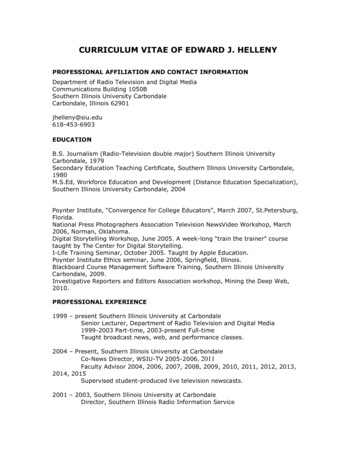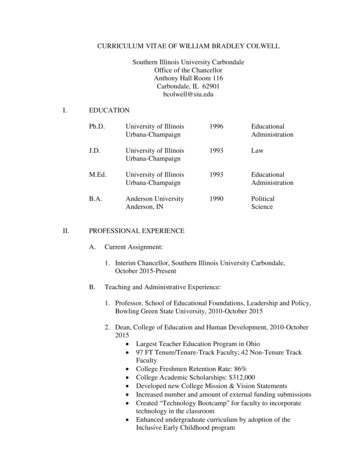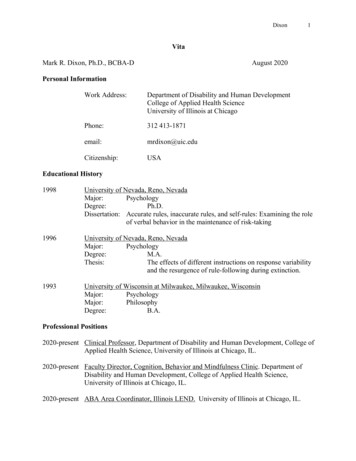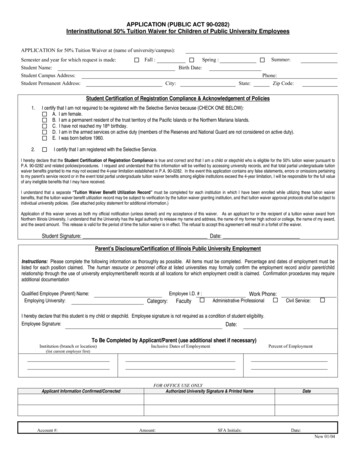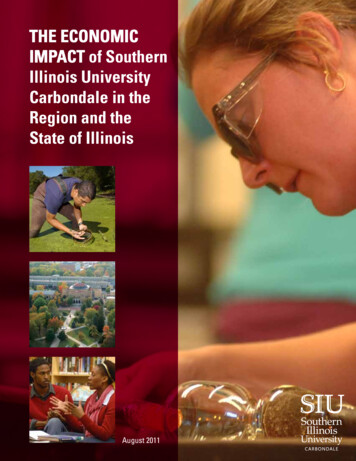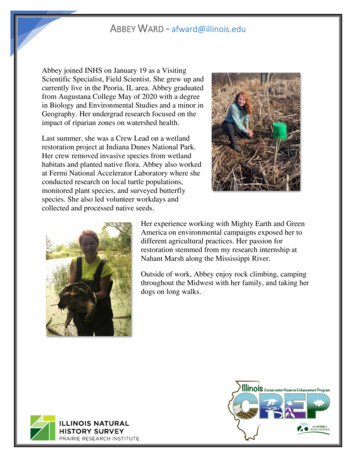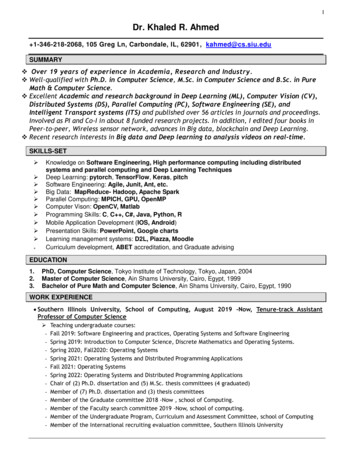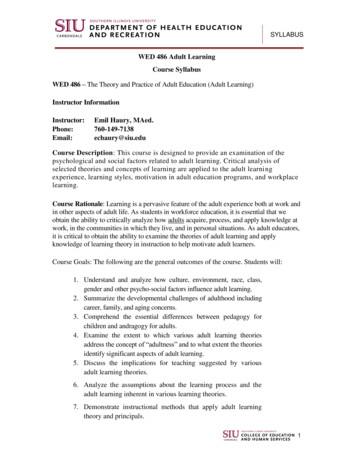
Transcription
SYLLABUSWED 486 Adult LearningCourse SyllabusWED 486 – The Theory and Practice of Adult Education (Adult Learning)Instructor InformationInstructor:Phone:Email:Emil Haury, MAed.760-149-7138echaury@siu.eduCourse Description: This course is designed to provide an examination of thepsychological and social factors related to adult learning. Critical analysis ofselected theories and concepts of learning are applied to the adult learni ngexperience, learning styles, motivation in adult education programs, and workplacelearning.Course Rationale: Learning is a pervasive feature of the adult experience both at work andin other aspects of adult life. As students in workforce education, it is essential that weobtain the ability to critically analyze how adults acquire, process, and apply knowledge atwork, in the communities in which they live, and in personal situations. As adult educators,it is critical to obtain the ability to examine the theories of adult learning and applyknowledge of learning theory in instruction to help motivate adult learners.Course Goals: The following are the general outcomes of the course. Students will:1. Understand and analyze how culture, environment, race, class,gender and other psycho-social factors influence adult learning.2. Summarize the developmental challenges of adulthood includingcareer, family, and aging concerns.3. Comprehend the essential differences between pedagogy forchildren and andragogy for adults.4. Examine the extent to which various adult learning theoriesaddress the concept of “adultness” and to what extent the theoriesidentify significant aspects of adult learning.5. Discuss the implications for teaching suggested by variousadult learning theories.6. Analyze the assumptions about the learning process and theadult learning inherent in various learning theories.7. Demonstrate instructional methods that apply adult learningtheory and principals.1
SYLLABUSRequired TextMerriam, S. B., Caffarella, R. S., & Baumgartner, L. M. (2007). Learning in Adulthood;A comprehensive guide, 3rd Ed. San Francisco: Jossey-Bass.Course Requirements: Assessment of student performance will be based on thefollowing requirements:1. Reflection Papers. A total of five papers, two-page maximum each representstudent’s thoughtful comments, statements of concern or dispute, and/orquestions raised based on the course readings, class discussions, etc. (100 pointstotal, 20 points)2. Research Paper. A research paper based on a selected adult learning theory. 8-10pages maximum. (200 points)3. *A. For seated classes only: Group Presentation/Instructional Session. Studentgroups will select a topic/chapter from the list assigned by the instructor andteach the class on the premises of adult learning. Students may choose to engagethe rest of the class (e.g. discussion, case study, etc.) (200 points)OR**B. For Online classes only: E-Learning Assignment. You will be required toresearch adult education theorists, discuss the implication of learning in theworkplace, and describe your philosophy of adult education. (200) points4. Participation. This is a discussion-based course. Students are expected to attendclass, come prepared (having read the readings for the class), and to participatein the discussions. (100 points) (Online students must participate on thediscussion board.)5. Optional Exam. To be decided by the Instructors. An essay exam based on issuesraised in the text, readings, and class discussions will be given as a final exam onthe last day of class. (100 points)*Assignment 3A Group Presentation is meant for students enrolled in seated classesonly. Students enrolled in a seated class are not required to complete Assignment 3 B(E-learning).** Assignment 3B: E-learning is meant for students registered on the online classes only.Online students are not required to complete Assignment 3A (Group Presentation).2
SYLLABUSPolicy and StandardsStudents are expected to attend class, read assigned materials, participate in classactivities, and complete other requirements as may be assigned. Most problems anddisagreements between students and instructors can be avoided by open communicationat the beginning of a course. Therefore, you are encouraged to ask your instructor aboutany issue not understood.Informal attire is permitted, but please dress in a manner appropriate for a universityclassroom. No hats or caps are to be worn in the classroom. Food and beverages may beconsumed during class only if local conventions permit. Regarding all other matters,students are expected to be familiar with and adhere to the Student Conduct Code.Students needing course-related accommodations should contact the instructor during thefirst week of class.Attendance PolicyClasses will convene from 8:00 AM to 3:50 PM with a ten minute break on the hour andlunch from 11:50 AM to 1:00 PM. According to SIU policy, students may not miss morethan one-third (2 days) of scheduled time for courses conducted on the weekend format.Students unable to attend need to contact the Instructor or Base Coordinator prior to orASAP after an absence.Academic Integrity PolicyAcademic integrity involves a student’s obligation to act with honesty and to respect therights of other in carrying out all academic assignments. Students are expected to exhibitthis quality at all times. The University policy concerning academic dishonesty will bestrictly adhered to. Violations of this policy include:Plagiarism or representing the work of another as one’s own workPreparing work for another that is to be used as that person’s own workCheating by any method or meKnowingly falsifying or manufacturing scientific or educational data andrepresenting the same to be the result of scientific or scholarly researchKnowingly furnishing false information to a university official relative toacademic matters Soliciting, aiding, abetting, concealing, or attemptingconduct in violation of this policyAny violation of the policy can result in immediate failure of this course; conduct boardpenalties, or both. If you have any questions about whether a particular behavior is inviolation of the University’s policy, you should ask before proceeding.3
SYLLABUSEmergency ProceduresSouthern Illinois University Carbondale is committed to providing a safe and healthyenvironment for study and work. Because some health and safety circumstances arebeyond our control, we ask that you become familiar with the SIUC BuildingEmergency Evacuation Plan. Instructors will provide guidance and direction to studentsin the classroom in the event of an emergency. It is important that you follow theseinstructions and stay with your instructor during an evacuation.4
SYLLABUSINSTRUCTIONS FROM YOUR INSTRUCTORHello Class!I am your course facilitator for the upcoming WED 486 Adult Learning course. Thiscourse will include a number of topics with special emphasis on areas of most concernto our SIU students majoring in Workforce Education and Development.Prepare for the first weekend meeting with the following:1. Completed (typed) Student Information Form (last page of attached syllabus)2. Weekend 1 Assignment (Reflection Question 1)3. Course Textbook: Learning in Adulthood (2007)I look forward to working with you on what can be a very unique class and experience.Emil Haury, MAed.Instructor:Emil (Charlie) HauryOffice Hours:9:00 pm – 4:00 pm (M-F) (avail. by text)Telephone:(760) 419-7138 cellE-Mail:echaury@siu.eduCLASS SESSIONS: 2013Weekend 1: January 11 & 12Weekend 2: January 25 &26Weekend 3: February 8 & 9 – No class meeting (E-Learning homework due)Weekend 4: February 22 & 23LocationNaval Air Station North Island, building 20055
SYLLABUSMETHODS OF INSTRUCTION/LEARNING LectureClass Discussions & ActivitiesIndividual Participation & AssignmentsTeam Presentations & AssignmentsWRITTEN WORKAssignments must be written in APA format (6th edition). This includes (among otherguidelines):Cover pageIntroductionConclusionReference pageIn-text citationsHeader (with page numbers)Headings for sections of the paperParagraphs indentedTimes New Roman (12 point)Double spacingSix Assumptions Regarding Adult Learning1.2.3.4.5.6.Adults need to know why they need to knowAdults need to learn experientiallyAdults approach learning as problem solvingAdults learn best when topic is of immediate valueAdults need to integrate new ideas with what they already knowAdult emotions are critical to their learning, motivation, and memory6
SYLLABUSCOURSE ASSIGNMENTSNote: All assignments must be typed. Formal papers must be in APA ividualClass Participation1Sat2IndividualStudent Information SheetIncluded insyllabus1Sun5IndividualReflection Question 11-2 pages2Sat10IndividualReflection Questions 2 &31-2 pages perquestion2Sat &Sun25TeamPresentationChaptersAssigned3Sat &Sun20IndividualResearch PaperOn-line5-7 page writtenpaper4Sun10IndividualReflection 4 & 51-2 pages perquestion4Sat &Sunday10IndividualPresentation of ResearchPaper5-8 minutes withPower PointslidesTotalPoints1007
SYLLABUSGradingA 90 to 100B 80 to 89C 70 to 79D 60 to 69F 0 to 59Grading PolicyLate Assignments: 20% reduction in points if late.Class ParticipationCriteria: Attendance in class is important to earn full points for participation.Participation means showing interest in the topic, participating in classdiscussions and in-class activities, asking relevant questions, extending thestudents’ understanding of the topic, being punctual to class and returning frombreaks, behaving professionally, being respectful in class, etc.Class participation requirementsAll learners come into a course with a rich and varied background of personalexperiences. These experiences should be freely shared; i.e., opinions,observations and perceptions relevant to the topic will form the point counterpoint that results in attitude formation and concept development.The foundation of learning is in active contextual interactivity and thedevelopment of mental models. The formation of these models depends uponactive, focused student participation. It is imperative that each student sharewell-reasoned, thoughtful opinions, examples and solutions, oriented to adulteducational challenges.E-Learning AssignmentCriteria: Complete all stated requirements in this syllabus.Research ReportCriteria: Follow the guidelines and meet all schedules using innovativeapplications in the development of deliverables.PlagiarismPlagiarism on any assignment will result in zero credit.8
SYLLABUSWED 486 – Adult LearningDue: Weekend 1Student Information Form (2 points)1. Student Information form (Individual)2. Two choices for Research Paper (Individual) – see list of choices on syllabusReflection Question 1 (5 points)As an adult learner, what do you perceive to be barriers to your learning?List and discuss using a mind map (include in your paper).Please refer to The Power Point on Mind Map in the course content folder.9
SYLLABUSWED 486 – Adult LearningDue: Weekend 2Reflection Questions 2 & 3 (5 points each)Maximum of two pages for each questionQuestion 2:a. As an adult learner think of an individual who you would identify as the bestinstructor and the instructor you consider the worst.b. Discuss what you find/found to be motivating about the best instructor and whatyou find/found the least motivating about the worst instructor.Question 3a. Access Geerte Hofstede’s weblink and list the six dimensions of culture anddiscuss how his approach may be useful in motivating learners from differentcultures?b. Compare at least two different countries and their national culture usingHofstede’s dimension breakdown, and explain what elements may be differentwhen building a course lesson that contains the same objectives.Textbook Chapter(s) Presentation (45 minutes) - TEAMTotal 25 pointsPart A: DevelopmentIn groups of 4 or 5 develop a Power Point presentation (with Speaker Notes andReferences) and an associated activity (quiz, discussion, game, etc.) on an assigned textchapter or topic. The 45 minute presentation will capture the themes, insight andessential evidence supporting these themes. Teams will then present this presentationutilizing sound adult educational principles.Criteria include:1. Identification of the big picture as well as the details in the chapter or the topic.2. Application of motivational and instructional design principles and presentationtechniques. This is a lesson, not a briefing.3. Demonstrate a deep knowledge of the chapter or topic.4. Create an associated activity to capture the content of the chapter and deliver tothe class.10
SYLLABUS5.Distribute electronic or paper copies of the Power Point slides to all students.Give a paper copy to the professor (the professor’s copy will have the copy withthe Speaker’s notes) at the beginning of the presentation so she can take notes onit.Part B: PresentationPresent the Chapter PowerPoint Lesson to the class in accordance with the classschedule.1. This is a professional presentation similar to one usually made in a businesstraining environment. Dress the part.2. Demonstrate expertise, empathy, enthusiasm, clarity and cultural responsiveness(see Chapter 3 of Enhancing adult motivation to learn)3. Teams should provide examples of chapter concepts and lead discussions withthe class. Do not merely read PowerPoint slides. Many students use additionalsource information to enrich their presentations.4. Post or hand out copies on the PPT presentation prior to the presentation.5. Encourage discussion and do your utmost to encourage student interactivity andparticipation via the associated activity.11
SYLLABUSPoints Distribution:Presentation Grading Rubric: Teams that submit presentations will be equally assessedbased on the following grading rubric. Please consult the instructor if you needclarification of assignment instruction12
SYLLABUS13
SYLLABUSWED 486 – Adult LearningDue: Weekend 3 (E-Learning)E-Learning Assignment: Research PaperCourse Assignment – Research Paper (Individual)Adult Learning Research Paper (topics) & Presentation (20 10 points)From the list of selected topics in the field (see list below); each student will be assigneda topic and write a 5-7 page Research Report based on the topic’s relation to the adulteducational field.Assignment of your topic will be given by the course professor prior to the beginning ofyour research. Have topics approved by the first weekend of class. It is recommendedthat you have at least 3 options for the instructor’s .16.17.Andragogy vs. PedagogyCase Based LearningClassroom Assessment Techniques for the College InstructorClassroom Management Skills for the College InstructorCollaborative/Competitive LearningDiversity Issues in Adult LearningFacilitation Skills for the College InstructorGestalt LearningInquiry LearningLearning and forgetting curvesLearning ContractsLearning from MentorsLearning Management System (LMS)Learning Style Inventories (LSI)Motivating the Adult LearnerOnline LearningOperant Conditioning14
SYLLABUS18. Self Directed Learning19. Social Learning20. Using Games, Simulations, and Puzzles when TeachingResearch Paper Assignment RubricFinal papers must be 5-7 double-spaced pages with a maximum 12-point font.In addition to the following rubric below, the following list identifies points associatedto the major elements of the research paper:20 points1. Topic is important for adult educators2. Research question/problem statement is clear3. Ideas flow smoothly from paragraph to paragraph4. Conclusions are drawn appropriately5. Recommendations are clear, appropriate, and feasible6. APA style used correctly within text and on Reference List (Please see APAFormatting and Style Guide for guidance.)7. A minimum of 4 scholarly resources (Note: Wikipedia is not acceptable.) areincluded as in-text citations.8. Properly APA formatted reference list9. Little to no misspelled words or grammatical errorsPoints will be deducted for each, if deficient:1. Topic is not a relevant issue for adult educators2. The research question/problem statement is not clear3. Ideas are unorganized and do not flow smoothly4. Ideas are not related to the topic5. Conclusions are not consistent with the discussion6. Recommendations are incongruent7. APA style is used incorrectly8. Less than four resources are utilized9. In-text citations are missing10. Reference list is missing11. Multiple misspelled words and/or grammatical errors exist (more than 3)12. Papers longer than 7 pages (The Reference List and cover page are notconsidered part of the 5-7 page length of the paper.)15
SYLLABUSResearch Grading Rubric: Learners who submit essays will be equally assessed basedon the following grading rubric. Please consult the instructor if you need clarification ofassignment instruction.20% will be deducted for: Late submission16
SYLLABUSWED 486 – Adult LearningDue: Weekend 4Reflection Questions5 points each; maximum of two pages for each questionQuestion 4:a. As an adult learner, describe how you have learned from mentors or how youhave learned as a mentor in a personal or professional context.b. Please find an academic article on mentoring and include content in the response.Question 5:a. As an adult educator, what challenges do you foresee in dealing with adults withlearning disabilities?b. How do you see yourself handling a teaching-learning scenario where there areindividuals with learning disabilities in a mixed group?c. Please find an academic article on learning disabilities and include content in theresponse.Adult Learning Research Paper (topics) Presentation10 pointsa. Create a Power Point presentation (with Speaker Notes) that captures the mainpoints of your Research paperb. Deliver a 5-8 minute presentation using your Power Point slides and any othervisual aid(s).c. Issue a copy of the presentation (with Speaker Notes) to the Professor prior todelivery.17
SYLLABUSd. Student Information FormName PrintedOccupation &Program AdvisorSouthern Illinois University – CarbondaleEmployerEmail:Phone:Cell:( )Work:( )CAREER GOAL - What do you see yourself doing in the next 5 years – next 10 years?EXPERIENCE - Describe any teaching activities involving adults that you participate in orhave participated in (other than the WED program).What topics would you especially like to have covered or what types of information wouldyou like from this course?3 Choices for Research Paper (select from the list-pg.10 of syllabus):18
SYLLABUS WED 486 Adult Learning Course Syllabus WED 486 - The Theory and Practice of Adult Education (Adult Learning) Instructor Information Instructor: Emil Haury, MAed. Phone: 760-149-7138 Email: echaury@siu.edu Course Description: This course is designed to provide an examination of the
